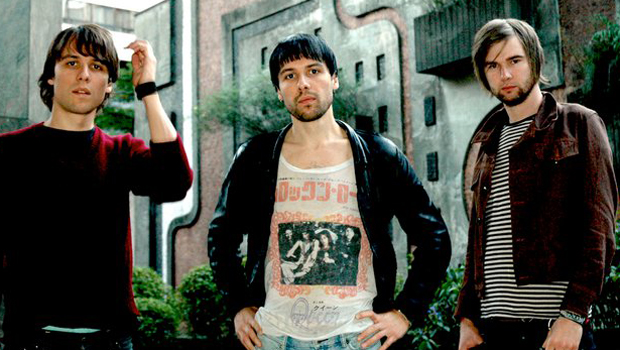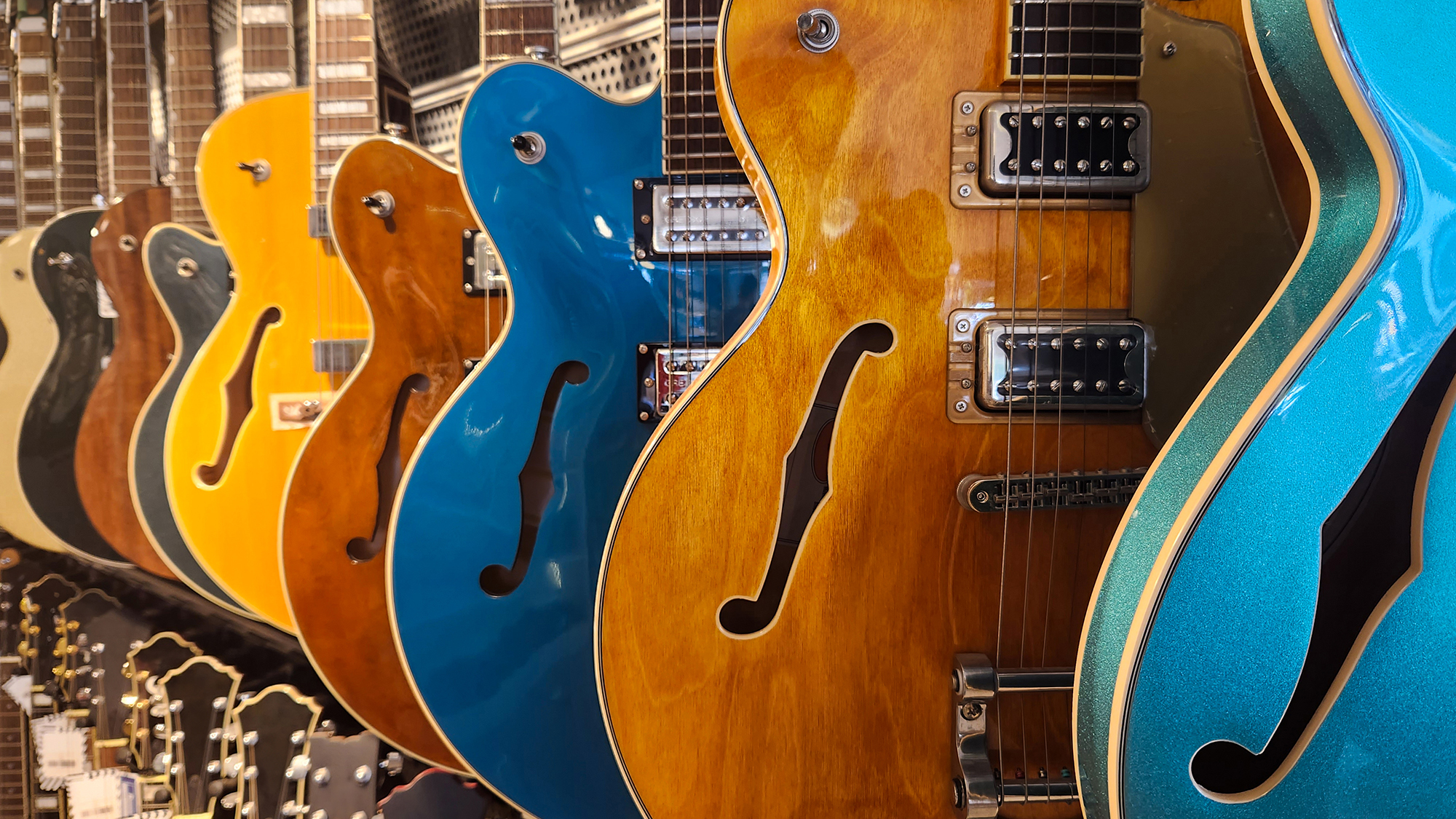All the latest guitar news, interviews, lessons, reviews, deals and more, direct to your inbox!
You are now subscribed
Your newsletter sign-up was successful

The Cribs aren’t your typical British guitar punks.
That may be due to the fact that guitarist and bassist, Ryan and Gary Jarman, have known each other since, well, the crib.
The twins form two-thirds of one of the UK’s most popular indie acts (They’re joined by younger brother Ross behind the drums), whose fifth album, In the Belly of the Brazen Bull, comes out May 15 via Wichita Recordings.
The new LP is the band’s first since the departure of UK guitar god Johnny Marr, the ex-Smiths picker who joined the band for 2009’s Ignore the Ignorant and its supporting worldwide tour.
Not surprisingly for those familiar with Marr’s previous work, that album showed the four-piece exploring its melodic side more so than ever before. Three years later, Brazen Bull finds The Cribs returning to their punk roots on tracks like “Chi-Town” and “Come On, Be a No-One.”
In a recent interview with Guitar World, Gary explained that Brazen Bull’s relatively quick recording process brought he and brothers back to their old ethos. “We had that real camaraderie of us all being together. It was reverting back to how we did things when we first started out.”
Meanwhile, it wasn’t until later that Ryan, who shared guitar duties with Marr during his tenure, realized he was once again the group’s sole lead axeman.
All the latest guitar news, interviews, lessons, reviews, deals and more, direct to your inbox!
“When we were at the first soundcheck, I was like, ‘I completely forgot to work out Johnny’s parts,’” said the guitarist, who also sings many of the band’s songs. “When you’re with one of the greatest guitarists in the world and then you have to play both his parts and yours, it’s not exactly ideal.”
Guitar World’s interviews with Ryan and Gary are below, presented in two parts.
PART ONE: Ryan Jarman
GUITAR WORLD: When did your love affair with the guitar begin?
Originally, I was into Brian May from Queen when I was 9 or 10. There’s no way you can really play like that when you’re young, so I kind of lost interest and later got into bands like the Ramones and the Sex Pistols when I was about 14. I still have my guitar I got when I was 10. I had a guitar teacher, and the first thing he showed me was a power chord, and he was like, “If you learn that, you can play most of those songs by the bands you’re into.” I had a couple more lessons and formed a band straight away.
What was it like having Johnny Marr, one of your childhood heroes, in the band?
At the time, you don’t really think about it. You kind of forget about it quickly. Before he joined, we were getting along really well and then we just started playing, because if you get along as friends the next step is sit down and play. He treats people as equals, so there was never that hierarchy of being in a band. Afterwards, you appreciate things for what they are more. It was my first experience playing with another guitarist really, so the fact that it was also one of my favorite guitarists was really cool.
Onstage in Minneapolis, you mentioned self-deprecatingly that it was hard to replicate Johnny’s parts from Ignore the Ignorant. Has that been especially difficult at recent shows?
Not really. When we’re in Europe and the UK, one of our friends plays Johnny’s parts. When we’re in America, we just have problems with immigration so we have to play as just the three of us. When we were at the first soundcheck, I was like, “I completely forgot to work out Johnny’s parts. Fortunately, because we know the songs so well, it didn’t take long to find a way of playing both. When you’re with one of the greatest guitarists in the world and then you have to play both his parts and yours it’s not exactly ideal.
What kind of gear did you use on the new album?
Fenders. I did move on to the Gibson GB5 for awhile, but right now I’m totally about being on Fenders. The main guitar I use in the studio is a Jaguar with a DiMarzio pickup. To me, that’s my favorite configuration. I just like a decent Fender solid body with a DiMarzio. It’s got such a heavy sound, which is what I’ve always been into, because lot of our guitar sounds are really heavy.
My main live guitar is a Squier Venus. They made a bunch of Squiers in the mid-’90s. They’re cheap guitars, but they aren’t based on any of the Fender body shapes - they’re all original body shapes and they’re all really well-built. That was my era, so I was always a really big fan of those. I use that a lot on the record, too. I’ve also got an old Orange amp that I used in pretty much every session for the new album.
What do your parents think of The Cribs?
My parents like the band. I think they’re just happy that we found something that we’re good at and we’re passionate about. My mom always encouraged us to go down the artistic route, so she really likes seeing that side. Before the band started, me and Gary went to college and we weren’t enjoying that and we weren’t actually showing up all the time. Then we worked some crappy jobs that we didn’t care about, so I think they were really pleased we made a go out of it.
What’s your favorite Cribs song to play on guitar?
My favorite Cribs song to play on the guitar is on the new album - “Glitters Like Gold.” The reason why is because it’s just a very busy part. I tried to make every section as complicated as possible. It’s not like metal-shredding - I’m not a shredder and I don’t ever intend on being - but it was just kind of a fast wig-out in the song. I just really enjoy playing it.
What’s your favorite guitar solo of all time?
Probably “A Winter’s Tale” by Queen. It’s pretty simple, but it’s a really great guitar solo. He hits some really nice intervals. That’s a very melodic solo. Brian May’s my favorite guitar player. I also like “Bijou” off of Innuendo.
PART TWO: Gary Jarman
Did you and your brothers play music together as kids?
Yeah, we did quite a lot. We didn’t have much else to do, really. We weren’t sporty and Wakefield wasn’t the most exciting town to grow up in, so we hung out together and just played together. The most pivotal moment of my life was not getting a bass, but it was probably getting a four-track recorder when I was 13 or 14. That’s kind of what changed my life - to have the ability to record like that. That’s what me and my brothers would do - we’d just record Ramones covers in the bedroom and try to write our own little songs.
What was the moment you decided to commit to being a real band?
I had high school bands, which really amounted to nothing more than coming up with a band name and a logo. My high school bands were theoretical ideas. We would play at the local youth clubs every once in awhile, and that’s really where we cut our teeth. It wasn’t until 2001 when me and my brothers set up a recording studio. Me and Ryan, we really just wanted to record stuff to test the gear out, and then we got Ross into it.
He’d played drums as a kid but hadn’t really played properly at that point. We got a deal in 2002 on the back of our demo, and it was only at that point that we decided to start playing shows. It was really ramshackle at first, but that didn’t matter to us because it was more about the spirit than the technique. It still is.
You started off with a lo-fi sound and graduated to a more expansive sound on your last few albums. Was that a conscious decision?
To me, we were always trying to record well but our methods were kind of limited. We recorded on junky old gear and tried to make it sound as good as we could. When we made the first and second records (2004’s The Cribs and 2005’s The New Fellas, respectively), we had a desire to record them quickly, because we thought it would be cheating to overdub things and add things we wouldn’t be able to replicate live. We had some commercial success on the second record, which was surprising with it being as lo-fi as it was, but every one of the singles had Top 40 success in the UK, which was bizarre.
We decided to at least try to make a sonically bigger record on the third record (2007’s Men’s Needs, Women’s Needs, Whatever), and now it’s fun to be able to craft everything in that way. With the fourth record, Johnny had a different way of working, so we spent a long time recording that record and layering it more. With the new record, we put off a lot of that stuff. I never really enjoyed spending too long recording and overdubbing stuff. We like to just capture the good live takes, and that’s what we did on this album.
